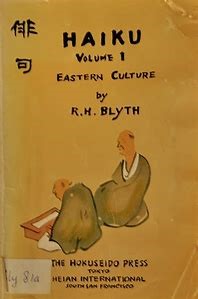I used drugs—marijuana, LSD and ecstasy—in the Sixties but I never thought of them as therapeutic. The author, Seth Lorinczi, and his new autobiographical book, Death Trip, A Post Holocaust Psychedelic Memoir, has opened my eyes as never before to the idea that psychedelics can help heal the trauma of the Holocaust. In Lorinczi’s telling of the story, psychedelics rescued him, psychological speaking, from the legacy of Fascism, World War II and the extermination of millions of Jews.
World
On the Road with R. H. Blyth

I found the first book of R. H. Blyth’s four volume set, Haiku, (originally published between 1949-1952) in a used book store on St. Mark’s Place. If haiku seems no more pertinent to you than, say, heraldry—one more subject about which even an informed person “need not be ashamed to know nothing”[1]—you may be mollified to hear I had an excuse to check Eastern Culture since I was Christmas shopping for a nephew who’s on his way to Japan this spring. The book’s cover—“Oriental brown simple rough peasant cloth”—got me to open “the Blyth Haiku bibles” (pace Allen Ginsberg, Allen Ginsberg). I fell in…
“Plop!”
To quote the last line of “the most famous haiku” with frog-and-pond as translated by Blyth—scholar-gypsy who brought the East to Beats and Salinger (see J.D.’s bow to Blyth in “Seymour, An Introduction”: “…haiku, but senryu, too…can be read with special satisfaction when R. H. Blyth was on them. Blyth is sometimes perilous, naturally, since he’s a highhanded old poem himself, but he’s also sublime.”)
Poetry is Everyday Life
This is a chapter from Blyth’s first book, Zen in English Literature and Oriental Classics.[1]
…
From Aristotle down to Arnold it was considered that a great subject was necessary to the poet. Arnold says that the plot is everything. It is useless for the poet to
imagine that he has everything in his own power; that he can make an intrinsically inferior action equally delightful with a more excellent one by his treatment of it.
Wordsworth stands outside this tradition by instinct and by choice. He chooses the aged, the poor, the idiot, the vagrant, but does not endeavour to make them “delightful” at all.
Blythe Spirits
Excerpted from Kirkup’s introduction to The Genius of Haiku: readings from R. H. Blyth on poetry, life and Zen. Published by the British Haiku Society.
I first became aware of the works of Blyth in 1952 or 1953, when I held the Gregory Fellowship in Poetry at the University of Leeds. It was also a time when I when I was discovering Chinese and Japanese poetry and philosophy, and reading books on Zen Buddhism that were beginning to proliferate in those days, and to have a certain influence on the Beat poets of America. whom I barely knew, though I had heard of Ginsberg, Jack Kerouac and the City Lights poets. I was also reading the works of Daisetz Suzliki and Alan Watts, the gurus of the Beat Generation.
Preface to the Korean Edition of “The Magna Carta Manifesto”
This chapter from Peter Linebaugh’s Stop Thief: The Commons, Enclosures and Resistance opens with aristos’ charming spin on the human right to rest. But Linebaugh isn’t one to go on in defense of laziness. Near the end of this short piece, he invokes bookish Reds who once insisted a “Communist is a mere bluffer, if he has not worked over in his consciousness the whole inheritance of human knowledge.”[1] Linebaugh has surely put in work on that score. The fact that his essay is a preface to the Korean edition of one of his earlier books stands as a tribute to his worldliness. Linebaugh goes wide in this chapter (as ever) though he begins in bed…
Of the aristocratic and stylish Mitford sisters, Jessica provides us with the Lazy Interpretation of Magna Carta beloved by sluggards everywhere. As a lovely communist (two of her sisters were fascists) she was disowned by her family and fell from the social peaks of English aristocracy to the Dickensian depths of the Rotherhithe docks in London in 1939. Unable to pay the rent she and her husband lived in fear of the process-server who they avoided by going in disguises which the process server soon came to recognize. “Esmond had a theory that it was illegal and in some way a violation of Magna Carta to serve process on people in bed.”[1] So they stayed in bed all day and then all night, and again all the next day, and all the next night under the covers, before deciding to immigrate to America. (Tom Paine, too, thought that independent America was a realization of Magna Carta).
Sénégal on Fire
Macky Sall — Sénégal’s outgoing president (Inshallah) — has played one Trump card after another over the past year, as he’s tried to retain power. Sall got brazen about his contempt for his country’s democratic process a couple years ago when he started hinting broadly that he would run for a 3rd term, though that’s illegal under Sénégal’s Constitution which only allows a president two terms in office. He prepped for what he assumed would be his permanent ascendancy by defaming and jailing his main political opponent, a young firebrand named Ousmane Sonko who’s been exposing corruption among Sénégal’s political class for more than a decade.[1] When Sonko and his partisans refused to fade out quietly, Sall came out as a petty Big Man trashing the country’s (relatively) free press, unleashing violence against protestors and conflating democratic dissent with Islamist terror.
Navalny, Carlson and the traitors to democracy
Originally published on February 14 at Notes from the Underground.
The Russian regime has finally extinguished the life of Alexei Navalny. Navalny was being held in a remote labour camp and, according to the prison authorities earlier today, died while taking a walk — like you do.
focus on Fascism
why do it in poetic form?
because in an infinite variety of ways
that reside in the breasts of all living souls
any solution to the Fascist trend in all states
pulses and grooves inside each of us
we hear the basic call of consciousness & conscience
Some Principles of the Commons
Linebaugh’s principles made your editor rethink my attachment to “public happiness” — a phrase of Hannah Arendt’s that I’ve leaned on to evoke the excitement of (small d) democratic politics with its imperfectly human meld of egotism and solidarity. Linebaugh isn’t an Arendt man and he’s never been charmed by her hymns for the American Revolution. Aware our first Founding slipped slavery and the “Social Question” — all the challenges arising from mass poverty and de-skilled labor due to the Industrial Revolution — he’s unenthralled by America’s standard versions of democratic practice. Per Peter, public life/happiness in this country seems a straightened thing…
We distinguish “the common” from “the public.” We understand the public in contrast to the private, and we understand common solidarity in contrast to individual egotism.
While it’s probably wrongheaded to yearn for demos with no ego, Linebaugh’s distinction is coming through to me this morning. In my inbox today, there’s an announcement of the latest seminar aimed at (what one pale academic muckety-muck terms) “intellectual publics.” Like Linebaugh, I prefer more common things…
Kafka’s Literary Unconscious
An essay in last month’s Town Topics, a Princeton gazette, begins on target: “This is an anniversary year for Franz Kafka, who died on June 3, 1924—a doubly noteworthy centenary, given the immensity of the author’s posthumous presence, which suggests that if ever a writer was born on the day he died, it was Kafka.”[i] Given that “immensity of presence,” one would be hard put to define concisely its core significance. But I will attempt to get to that core by example—the core being the difficult beauty of Kafka’s writing, a beauty that is full of thought, and which has inspired, as is well known, a great variety of attempts to understand it. For Theodor Adorno, in a celebrated essay, satisfying the need to understand Kafka is a matter of life and death!
From the River to the BBC: Carnage and Complexity in Gaza

CNN fired a photojournalist who was embraced by the leader of Hamas.
Like many Jews, I’ve read things about the bombing of Gaza, seen things on TV, and heard things shrieked in the streets that have horrified me in starkly contradictory ways. The truth about this awful sequence of events is as hard to come by as it is complex, but the slogans mask as much as they proclaim, and the coverage does something even more ominous: it simplifies. Every day I’m glued to my TV, gripped not just by the unbearable images that the carnage has produced, but also by the stimulation of my senses, the spectacle of mass death. It’s what I’d call visceral news, which compels me to watch, and it’s all true. But it’s not the truth. That requires context, which isn’t a visual.
Julia Sebutinde

As soon as I heard the verdict of the International Court of Justice last week and heard the vote of 15-2 against Israel, I knew it had to be a woman. Who else could stand up to 15 men and vote with the old Israeli man?
Stuck and Moving (“Read Mosab Abu Toha’s Poetry & Go to War-torn Gaza”)
I have been reading and writing poetry ever since I was a boy growing up in Huntington, Long Island, not far from where Walt Whitman was born and raised, and where he founded the newspaper, The Long Islander, which published my column on high school sports. At the age of 82, I still turn to poetry more often than to newspapers for news of the world, local, national and international. Recently, I read and reread the timely and (perhaps) timeless poems about Gaza in Mosab Abu Toha’s Things You May Find Hidden in My Ear, published by City Lights.
That book appeared in print at about the same time that the author and members of his family, including his wife and children—and thousands of other Gazans—were detained by Israeli soldiers. Fortunately, Toha’s wife and children were released and allowed to travel to Egypt where the poet joined them, and then wrote and published an eye-opening account of his own harrowing arrest, incarceration, and interrogation. That narrative was published in January 2024 in The New Yorker. In a short time, it has alerted readers around the world to Toha’s poetry and to his own newsworthy story.
Talk Therapy (or Lip Service)?
Twitter dialogue between…
Fania Oz-Salzbarger [“Mom, Israeli, Jewish, humanist, History prof. Loving daughter of Amos Oz. Tel Aviv U (BA, MA), Oxford U (D.Phil), Uppsala U (Dr. h.c) Democracy must win.”]
&
Ambassador Majed Bamya [“Deputy Permanent Observer of the State of Palestine to the UN, New York. Palestinian from Yaffa. Refugee. The time for freedom is always right now!”]
Hostile Intelligence: Reflections from a Visit to the West Bank
From the Anarchist Library—first published on July 30, 2015.
Sturdy New Acquisitions
Forgive me if I’m committing the sin of self-promotion, but I’d like to add an annex to my piece last month about the MET’s class-focused New Acquisitions show. There’s a trio of music videos—with soundscapes evoking hoods all across the world—that could have added a contemporary flash to that MET show.
“Ghetto Phénomène” Houari’s Le Chant des Ra ta ta—with its bass pace, main string riff, and Houari’s amped but unvocodered voice—was a constant on my Marseille rap playlist. Yet I didn’t realize the song was more than just catchy until I watched the video.
The City and the Commons: A Story for Our Time
The essay posted below is the one that brought Peter Linebaugh’s Stop, Thief! home to your editor (who morphed into a “New York City man” many years ago). Linebaugh’s case for “commonizing” the city seemed fresh and audacious, though he almost lost me when he invoked the panopticon. (Bentham? Again?) But Linebaugh wasn’t content to reheat Foucault’s leftovers.
“New Ancient Strings” (& Gangster Critics)
When I had a yen for kora music in the past, I used to play In the Heart of the Moon — the 2005 CD by Toumani Diabaté and guitarist Ali Farka Touré.[1] But last month I caught up with Diabaté’s CD of duets with another kora master, Ballaké Sissoko. Their cooly canonic New Ancient Strings (1999) may be my go-to kora groove going forward.
To the God of Abraham
You
make me taste your
……………….vastness on my tongue
then dismiss me
one of many loved
……………….beneath the belly of the sun
Two Histories of Germany: Frank Trentmann’s “Out of the Darkness, the Germans, 1942-2022” and Katja Hoyer’s “Beyond the Wall: A History of East Germany”
Frank Trentmann, a German-born historian, teaches at the University of London and writes books in felicitous English. The special distinction of his latest study is its focus: Out of the Darkness is a history, not of facts alone but of the successive agonies of conscience besetting the Germans from the years 1942 (with the beginning of the rout at Stalingrad) till the present, with Germany’s diffident support of the Ukraine. It is a history of moral mentalities.